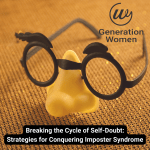Job interview rejection is gutting. It actually hurts. And for good reason, social pain impacts the same parts of the brain as when processing physical hurt like a burn. We all feel this pain differently, and you may know someone who always seems bounce back easily, no matter how big the rejection. Why can’t you? You can learn from them, and by borrowing a few of their techniques, you can become more resilient too.
It can feel like the worst moment. You’ve been pinning your hopes on a certain job. It even felt like the job spec had been written for you. But, you start to suspect things may not go your way when it’s taking a little too long to hear back. Then it happens, you get the letter to say thank you for your time, but no thank you!
If you came out of the interview thinking ‘I could have done better, …’ then look at where you could have improved and put a plan in place to address it. If you KNOW you did the absolute best interview you could, then it will likely feel more harder to handle.
Stop taking it so personally
Those that take job interview rejection hardest are those that take it personally. I get it. It can feel like they’ve rejected you as a person. That’s your emotions talking. Let’s get out of that type of emotional thinking by asking yourself
‘what OTHER explanations are there for them to offer the job to someone else? ‘
The reality is, there are lots of reasons that have absolutely nothing to do with who you are as a person. The main one being…somebody else likely had a closer fit to the skills they were looking for. That doesn’t say anything negative about you. It doesn’t mean they didn’t like you, or didn’t think you could do the job well, someone else appeared to be a closer fit.
Remember, interviewers make decisions based on any number of reasons, and have many internal biases that they are completely unaware of. It could simply be that the selected candidate may have appeared to be a better cultural fit. It’s not fair, but that can be the case.
There’s no such thing as failure, only feedback
Once you’ve got past the initial disappointment of job interview rejection, it’s time to learn and grow from the experience. Every interview can teach you something new about yourself, about your strengths, and about what you need to work on. Whenever you do an interview, I encourage you to take 10 minutes to think about and note down:
- What I did well
- How I would be even better next time
You need to focus on what you did well first of all. Why? Many of us have a tendency to go straight into critical mode, and fail to recognise all the good stuff we did. We then amplify the things we didn’t do as well as we’d like and drown out all of the good. That will chip away at your confidence.
When you recognise the things you do well, AND do it as soon after the event as possible, then you’re more likely to repeat AND IMPROVE that behaviour. Only then should you focus on how you could have bettered your performance.
Ask for Feedback
You should always ask for feedback. Treat this as a learning experience and understand how you can grow from it. Feedback will help you grow your awareness of what you did well and how you can improve for the next time. Make sure that you take on board what is said, and use it as an opportunity to get better.
What did you learn from the experience that you need to develop more skills or expertise in? Were there questions you found a little challenging to answer? I was rejected for the first management position I went for. There were two of us got to second interview, which took the questions to a whole new level. I struggled with it big time! Once I got past feeling humiliated, I could see that I’d done very little to get any management experience. From that point on, I asked to lead more projects, and take on other responsibilities. The truth was I wasn’t ready for this job, and it would likely have been a disaster had I got it. What can you do to develop the what you need to progress?
Recognise that this is a two-way process
Finding the right job isn’t just about you being selected, it’s about you doing the selecting too. The more I coach people for interview, the more I recognise this as the most important part of job-hunting. We tend not to get the jobs that aren’t right for us. Pay attention to that. This job wasn’t the right fit for you, and there’s a strong likelihood you wouldn’t have been happy in it. Be glad! Above all you may have made a lucky escape. Perhaps your management style wouldn’t have aligned with the culture, perhaps you were too good for them, perhaps this role wouldn’t have given you the challenge you need!
Use this job interview rejection experience as a reminder to have your radar on full power when you apply to a company. This will help you make better informed decisions about whether you want to work there. Pay attention to how they communicate with you, and notice:
- What clues are there that you will or won’t be happy here?
- What’s the environment like?
- What was the style and approach of the interview panel?
- What were the other employees you came into contact with like?
- How happy were they?
And remember…
“Rejection doesn’t mean you aren’t good enough; it means the other person failed to notice what you have to offer” Mark Amend
The truth is, if you did your absolute best and they can’t see and appreciate what they have in front of them, then this isn’t the company for you! You want to work in a place that respects you and sees you for your greatness. People that don’t get that don’t deserve you. Move on and find a company that does.







